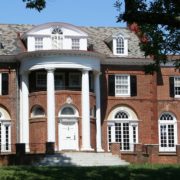Appointments
Bergen Community College Appoints Interim President
Michael Redmon has been appointed as the interim president at Bergen CC. The change comes after trustees at the school voted to fire former president, Kaye Walter, after six years at the school. Redmon is a former college administrator at schools in Florida and Indiana.
read more
Cheney University Names Interim President
Cheney University has announced that Mr. Aaron A. Walton will become the school’s interim president. Walton will take over for Frank G. Pogue, who has been interim president since November 2014.
read more
Great Basin College Appoints Next President
A new president has been appointed at Great Basin College. Ms. Joyce Helens was picked out of three finalists to take over at the school. Helens was previously president of St. Cloud Technical and Community College in Minnesota. She will begin August 1st.
read more
New President Named at Jackson State University
Dr. William Bynum Jr. has been named the next president at Jackson State University by the school’s Board of Trustees. The move is controversial because Bynum was not one of the three initial finalists for the position. Bynum is currently the president of Mississippi Valley State University and will begin in July.
read more
Labette Community College Announces Next President
Mr. Mark Watkins has been named the new president at Labette Community College. Watkins is currently the Dean of Instruction at Labette. He will begin as president immediately.
read more
Lane CC President to Take Office
Lane Community College has a new President in office, Dr. Margaret Hamilton. Hamilton was previously the VP of academic affairs at Camden County College in New Jersey. Dr. Hamilton replaces Mary Spilde, who retired in June.
read more
Permanent Position for Chancellor at Louisiana Delta Community College
Dennis Epps has been approved by Louisiana Delta CC’s Board to become the school’s permanent Chancellor. Mr. Epps has served as interim Chancellor since 2005.
read more
MCC-Kansas City Announces New Chancellor
Dr. Kimberly Beatty has been named the 8th chancellor at Metropolitan Community College Kansas City. Beatty is currently serving as vice chancellor for instructional services and chief academic officer at Houston Community College. Dr. Beatty will replace Mark S. James, who retired at the end of June.
read more
New President Announced at Moreno Valley College
Dr. Robin Steinbeck has been named the new president at Moreno Valley College. Steinbeck is currently the school’s vice president of academic affairs, and will take over as acting president on July 1st.
read more
Interim President Appointed at Prairie View A & M
A new interim president has been named at Prairie View A &M. Dr. Ruth Simmons will take over the job on July 1st. Simmons was the first ever black president of an Ivy League school, serving Brown University up until 2012. Prairie View’s longtime president, George Wright, said he was stepping down to concentrate on teaching.
read more
St. Cloud Technical College Names Interim President
Ms. Lauri Kloos will become the interim president of St. Cloud Technical and Community College on August 1st. Kloos is currently the vice president of administration and CFO at the school. She will replace Joyce Helens, who has accepted the presidential position with Great Basin College in Nevada.
read more
Shawnee CC Selects Alumna as Next President
The SCC Board of Trustees has picked Dr. Peggy F. Bradford to become the school’s eighth president. Bradford attended Shawnee Community College, and earned her doctorate from Northern Illinois University. She replaces Tim Bellamy, who retired in April.
read more
Slippery Rock University Names Interim President
The Slippery Rock Board of Governors has selected Phillip K. Way, current provost and VP for academic affairs, to become the next acting president at the school. Mr. way is replacing Cheryl Norton, who retired as president in June.
read more
St. Petersburg College Promotes from Within
Dr. Tonjua Williams has been announced as the next president at St. Petersburg College in Florida. Williams is currently senior vice president of student services and has worked at the school for 30 years. She will replace Dr. Bill Law, who retired at the end of June.
read more
First Latino President Named at SUNY Albany
Dr. Havidan Rodriguez has been announced as the next president at SUNY Albany. Rodriguez is currently the provost and executive vice president for academic affairs at the University of Texas at Rio Grande Valley. Rodriguez will begin his post in September.
read more
Interim President Receives Permanent Position at Maine-Augusta
Dr. Rebecca Wyke has been appointed the new president at the University of Maine at Augusta. Wyke previously served as the school’s interim president in 2015. She replaces Dr. James Conneely, who resigned suddenly in April.
read more
New President Announced at The University of St. Thomas
Dr. Richard Ludwick has been named the next president at The University of St. Thomas. Dr. Ludwick was previously the president of the Independent Colleges of Indiana. Ludwick will succeed Dr. Robert Ivany, who retired in June.
read more
Washington College Appoints Next President
Washington College has announced that Mr. Kurt M. Landgraf will become the school’s new president. Landgraf will begin on July 1st following the resignation of former president, Ms. Sheila Blair.
read more
Retirements
Bluffton University President to Retire in 2018
Dr. James M. Harder has announced that he plans to retire in June of next year. Harder has served the university since 2006, and created 14 new academic programs at the school in that time.
read more
Carteret Community College President Retires
Dr. Kerry Youngblood has retired from Carteret CC. Youngblood said at his last meeting, “Thank you all for what a privilege it’s been.” Dr. John Hauser will replace Youngblood as the school’s president on July 3rd.
read more
Northeast State Community College President Announces Retirement Amid Investigation
Dr. Janice Gilliam has announced her immediate retirement from Northeast State CC. The announcement comes on the heels of an investigation by the Tennessee Board of Regents into Gilliam and the school.
read more
Retirement Announced at Thomas Edison State
Dr. George A. Pruitt has announced that he will retire in December of 2017. Pruitt has served the school since 1982. He said, “Serving as president of this wonderful university has been the single, greatest privilege of my professional life.”
read more
Ventura County CC President to Retire
The interim president of Ventura County CC will retire on June 30th. Dr. Bernie Luskin has served the school since May 2015, and will be honored with a ceremony.
read more
Resignations/Firings
Bentley President Stepping Down
Dr. Gloria C. Larson, president of Bentley College, has announced that she will step down in late June of 2018. Larson has been at the school for over a decade. “It has been the highest honor of my long and varied career to serve as Bentley’s 7th president,” she said.
read more
Carnegie Mellon President Resigns
Dr. Subra Suresh resigned from Carnegie Mellon College on June 30th. Suresh has served CMU for the past four years. Current provost and chief academic officer, Dr. Farnam Jahanian, has stepped in as interim president.
read more
Clarion University President Leaving after Next Year
Dr. Karen Whitney has announced that she will step down at the end of the next academic school year. She has been president of Clarion University since 2009.
read more
Ferrum President Fired after One Year
Ferrum Board of Trustees have announced that Dr. Joseph Spooner has been released from his contract at the school. Spooner was at the school for less than a year. Chris Burnley, vice president for business and finance, will serve on an interim basis.
read more
Harvard President Stepping Down
The President of Harvard University has announced that she will resign at the end of the next academic year. Drew Gilpin Faust has served the school since the summer of 2007. She is the first female president of the school.
read more
Resignation at Keene State College
Dr. Anne E. Huot has announced that she will resign as the school’s president on July 31st, 2017. “It has been a privilege to serve this great college,” she said. Huot plans to stay at the school as a biology professor.
read more
Firing at Luna Community College
Dr. Leroy Sanchez has been fired from his position as president at Luna Community College. Sanchez started at the school in 2015. The school’s hiring practices have been questioned since Sanchez has been president.
read more
Motlow State President Resigns
The president of Motlow State Community College has resigned. The resignation comes on the eve of an audit that accused President Tony Kinkel of using “fear and intimidation” while leading the college. Kinkel has been president at the school since August 2015.
read more
Northern Illinois University President Resigns
President Doug Baker Resigned in mid-June after an investigation concluded that he had bypassed bidding requirements when hiring consultants there. Baker denied any wrongdoing. He began as president in 2013.
read more
Chancellor Fired at Oakland Community College
Oakland CC president, Dr. Timothy Meyer, has been fired from the school. Meyer is still employed by the school, however Peter Provenzano is now the interim chancellor.
read more
Oklahoma State at Oklahoma City President Resigns
President Natalie Shirley has announced that she will resign at the end of December, 2017. Shirley has been president of the school since 2011. A national search is currently underway to choose a new president.
read more
Johnson Fired from Tuskegee University
Dr. Brian L. Johnson has been dismissed as president from Tuskegee University. The school has been struggling financially with long-term debt. Johnson was the seventh president at the school.
read more
Urban Resigns from West Shore Community College
Dr. Kenneth Urban has resigned as president from West Shore CC after two years at the helm. Board of Trustees Chairman, Bruce Smith said, “We came to the decision mutually.” VP of Administrative Services, Scott Ward, will serve as the interim president.
read more













